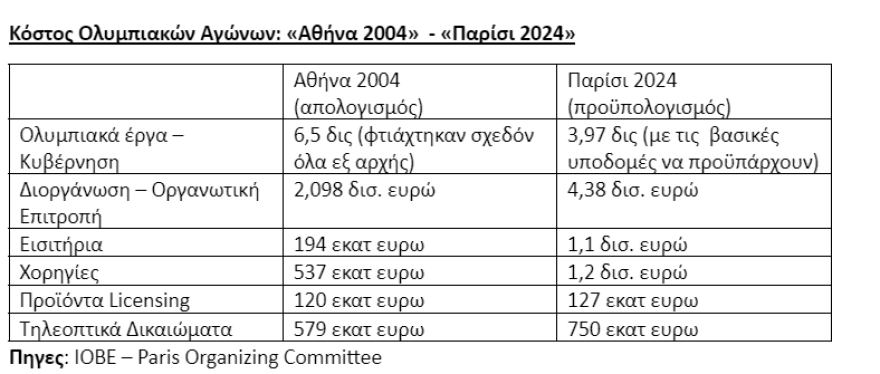The Paris Olympics boasts that it will keep costs under 10 billion euros by comparing its budget to similar other events including Athens 2004 where it was falsely shown in foreign media to have reached 18.7 billion euros.
The Athens Olympics, according to an independent study by the IOBE, cost €9 billion, of which €6.5 billion was for the Olympic projects (and not only), while the organizational part of the Athens 2004 committee slightly exceeded €2 billion, leaving a management surplus of €131 million.
This is a general approximation as there are differences in the individual items as shown in the table:

Sources: IOBE – Paris Organizing Committee
Although the two events are 20 years apart in their individual organizational characteristics they are similar

Sources: OEA Athens – Paris
And the budget of the Paris event may seem bigger than Athens’ but, as in all things, everyone is judged by the result! Because the Greek event has remained one of the most successful as it has achieved better results with smaller sizes, even leaving a management surplus of 131 million € of which seven went back to the government. The Athens 2004 surplus is second only to Sydney 2000 (19.5%), registering a better performance compared to London and Barcelona (Figure 3.19).
The surplus of “Athens 2004” could have been even higher if the event had achieved a similar stadium occupancy rate as the other events.
Paris, for its part, is “struggling” not to leave a deficit although it has achieved more in terms of tickets and sponsorships. Greece has had more success in terms of products and licensing as the event returned to its home city in 2004.
But what is of particular interest is that Paris did an Olympics with the basic infrastructure almost in place except for some interventions for hospitality. Greece for four years undertook a feat: To prepare infrastructure leaving a great “Olympic legacy of infrastructure that has raised the country’s standard of living.
Paris 2024 is expected to have net economic benefits of between €6.7 billion and €11.14 billion, with an intermediate scenario predicting a net economic impact of €8.9 billion, according to a report published by the Centre for the Law and Economics of Sport (CDES) at the University of Limoges in France.
In Greece, some €2.9 billion returned to the state coffers in the form of tax receipts and employer contributions during the preparation and staging of the Games.
Extending the financial “crash test” to other events (although the data are not directly comparable with those for Greece) we see the following:
– In Barcelona in 1992 the cost was 7.4 billion euros and the benefit to Spanish GDP was around 20 billion euros.
– In Atlanta in 1996 the cost was 1.3 – 1.8 billion euros and the benefit was small due to the size of the US economy.
– In Sydney in 2000 the cost was 3.8 billion euros and the benefit was 4.9 – 6.3 billion euros.
– In Beijing in 2008 the cost was €11.4 billion and the benefit was small.
– In London in 2012 the cost was €11.3 – 14 billion and the benefit was €20 billion.
Ask me anything
Explore related questions





